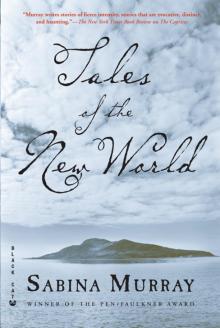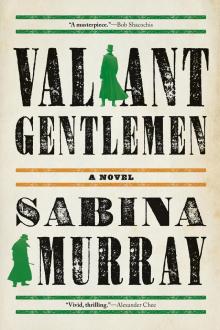- Home
- Sabina Murray
Valiant Gentlemen Page 3
Valiant Gentlemen Read online
Page 3
“To go find something that’s not a bush rat.” Ward calls out to Mbatchi and then heads towards the greenery. And, waving, “See you at dinner.” Mbatchi, loaded down with rifle and bag full of shot, follows after him, the pale soles of his feet raising up, lifting a low cloud of dust as he runs to catch Ward.
Ward does not appear that evening, nor Mbatchi, and although Casement knows he should not worry, his sleep is troubled by thoughts of poisonous snakes and the heavy crush of jungle that precedes the leopard’s kill. And there are natives who can see the value of capturing a man like Ward, with his golden hair and straight shoulders. Casement opens his eyes expecting the darkness but it is now bright. He can hear the river rushing against rocks, tearing at the banks. He has managed to sleep. Tom is panting and smiling on the floor beside him. He sits up in his cot and hears a child’s voice—it’s Mbatchi—chattering away to someone, although the camp still holds the quiet of early morning. He hears, Englishman, and, many Arabs, and, like a goat only bigger with very long ears. Casement gets up from his cot and parts the canvas flap to leave his tent. He reminds himself that he is not Ward’s keeper. He will be cheerful, not scolding.
“Mbatchi!” he says, too jovially. “You’re back. What is this goat with long, long ears?”
“For the Arabs to sit on.”
“It’s a donkey,” says Casement. “Don-key.” It would be good for the boy to learn some English. He pats Mbatchi’s head. He smiles, straining to be relaxed. “And where’s Mayala Mbemba?”
“With the white man,” says Mbatchi. “There were so many people,” he gestures around him, “and the great English chief is there too, but I didn’t see him.”
“The great English chief,” says Casement.
“His name is donk-key.” Mbatchi shakes his head. “No, Stankey. His name is Stankey.”
“Stankey? Do you mean Stanley?”
“Yes!” says Mbatchi.
“And what is Stanley doing in this region?”
“He is going to save another man, another great man.”
What nonsense is this?
“Mayala Mbemba says to go on without him and that he will find us in the afternoon.”
“Ah,” says Casement. He is walking away when he changes his mind. “Mbatchi,” he says, “this white man that you say Mayala Mbemba was speaking with, he wasn’t Stanley?”
“No.”
“What did he look like?”
“Like you, like Mayala Swami. He is a white man.”
Which is, of course, the correct response. What is Casement looking for from Mbatchi, who sorts into either the familiar or the unfamiliar? To Mbatchi, this anonymous white man appears in same alien register as a donkey or a crowd of Arabs. And what did he expect Mbatchi to say? That this other white man is tall and strong? That this other white man makes Mayala Mbemba laugh, or that they went hunting together? This is insanity and all diseases of the mind are easily succumbed to in Africa. One must be vigilant.
“Mayala Swami,” comes a voice.
“What?” says Casement, startled from his thoughts. It’s Kiskela, a Bakongo, and a supervisor.
Kiskela thinks before speaking. “We have gathered together the Manyanga women with the brass-wire jewelry, but they do not want to give it up. These are gifts, they say, from their husbands. We can take it from them, but they will be very angry, and the Manyanga are usually friends, but if we take jewelry from their women, they will not be so kind to us, and they have the fields just to the north. We will need to buy manioc from them—”
“I understand,” says Casement. He feels rescued by duty. What to do? “Take a case of brass rods and some cloth from the stores and buy the jewelry back. Bargain hard and keep track of everything. We’ll try to recoup some of our losses when we’re purchasing food.” Kiskela has a photographic memory for numbers and amounts. His retention of such knowledge is impressive, a gift that many of his people have—necessary when there is no system of writing.
“Is there something else?” asks Casement, as Kiskela has not moved.
“Mayala Swami, the women will want to see you.”
“Fine,” says Casement. “I will go there and wave my big white head at them.”
Kiskela smiles.
“I haven’t had any breakfast,” says Casement.
“You will have some soon,” says Kiskela.
Casement appreciates this about Kiskela, that he follows orders cleanly but always makes it seem as if getting things done is of personal satisfaction. There is respect here, and kindness, but not quite friendship.
This is a lonely, lonely place. Casement is twenty-two years old. In another life, he would be elbow-on-the-bar with other men his age, or reading history at Trinity.
“Kiskela!” he shouts. “No bush rat, please.”
What does Casement know of Henry Morton Stanley, the great explorer of Africa? He knows him as a charlatan. He’s heard the gossip—Stanley, a workhouse Welshman who escapes to America and reinvents himself as a Wild West journalist and now, suddenly, he’s the best expression of an intrepid Englishman. His first publicity stunt was finding Livingstone and delivering the droll phrase, “Livingstone, I presume.” Anyone who had actually met Stanley knew that he had no wit, even poor wit, and could not have come up with that. Stanley had carted this print-ready statement from London, along with his silly outfit and notoriously bad feet.
David Livingstone was a mediocre explorer, famous for confusing the source of the Nile with the Lualaba River, which flows into Upper Congo Lake. He also had a missionary bent, or a savior complex, depending on whom you spoke to. The fact of his ever being lost is up for debate. Ultimately, Livingstone became so confused with malarial visions that he ceased all communication with the civilized world—and was presumed dead—for six years. That is, until Stanley paid a visit to him, where he was living on the shores of Lake Tanganyika, the whole venture funded by the New York Herald. The jury is still out as to whether Livingstone wanted to be saved, or found, or conversed with, or whatever it was that Stanley had actually done. Still, it was a good news story. And how to follow it up?
Apparently with this stunt of saving Emin Pasha. The whole thing is absurd and no doubt the copy was already typeset before Stanley left for Africa—more of a script just waiting for Stanley to act it out.
Casement and Ward are facing off across the dinner table but Ward, his legs extended and ankles crossed, seems more occupied with his boots, which could use a polish.
“You’re not making any sense,” says Casement. He hears the edge in his voice, is worried that he sounds womanly.
“Well, you’re not making much of an effort to figure out the facts, are you?” Ward responds.
Ward is determined to attach himself to Stanley, since he fancies himself an adventurer. “I’m not the one who has been taken in by this ridiculous enterprise. In your effort to make the facts clear to me, it’s obvious that you have no idea what Stanley is up to.”
Casement reminds himself to sound less spurned, more like a counselor. “You must admit, there’s something odd about the venture.”
“Casement, I don’t understand why you’re so against Stanley.”
“I’m against all this puffery.” Casement shakes his head. “Who is this man?”
“The name is Ingham and he’s a representative of the Emin Pasha Relief Expedition.”
The clarity of this statement hangs in the air. Casement smoothes his mustaches. “And you said he was very interested in the Florida.”
“Yes. And in me. He seems to think I could be very useful to Stanley.”
“When we have the Florida at the edge of the Pool, it will be the only steamboat available for purely trade purposes.” Casement says the Pool instead of Stanley Pool because he refuses to be complicit in a testament to Stanley. “Every other boat is in the service of God and in the hands of the missionarie
s. He wants the Florida. He means to commandeer it.”
“Really?” says Ward. “And what if he does?” Ward empties the last of the bottle into his glass.
And so what? Casement will get nowhere with bullying. If anything he’ll prove himself to be bad company, and then it’s all over. “All right, Ward. So who is this Emin Pasha? What sort of man is he, and what has put him in such a perilous position?”
“Well, he’s a good sort of fellow.”
“He is?”
“He’s a consul, or a governor. And he’s an ally.”
Casement nods, affecting patience as Ward tries to put it all together. He feels like a schoolmaster watching as a student flubs the lesson. “And where is he?”
“He’s in Equatoria, southern Sudan.”
“Equatoria,” Casement considers. It’s beginning to make more sense. “He’s one of Gordon’s provincial governors, isn’t he?”
General Gordon, Governor General of Sudan, had been slaughtered by Mahdist revolutionaries a year earlier. At first, the English hadn’t wanted to get involved, and when they finally came around to seeing that perhaps Gordon did indeed deserve some help, it was too late. Troops arrived two days after the fall of Khartoum and Gordon’s death. Many British subjects had lost their lives and images of hanky-clutching women being carried off by turbaned men on Arab steeds had sold a lot of newspapers.
“If Emin Pasha is in Sudan, why is Stanley here in the Belgian Congo?”
“I wondered the same thing.” Ward seems proud of knowing to ask this obvious question. “It seems that old King Leopold also wants to give a hand in saving Emin Pasha, and so Stanley is starting here, you know, getting porters and supplies, the usual.”
“That’s ridiculous. To get to Equatoria with as many men as seems is happening, one should go from Dar el Salaam. Perhaps Equatoria looks close on a map, but that region is almost completely unknown and what’s known about it is not good. The Ituri Forest is notoriously populated with cannibal tribes and much of it’s a swamp.”
“It sounds like an adventure.”
“No, it sounds like money. Leopold. He wants to know if there’s something in that territory worth claiming—rubber, ivory. He’s thinks that sending Stanley through the jungle to rescue this Emin Pasha with the support of England, under the English flag—”
“It’s not, actually,” says Ward. “It’s not the English flag. They’re marching forward under the flag of the New York Yacht Club.”
“So there’s American money too.”
“Casement,” says Ward. “You can be so cynical. And, frankly, you sound like an old man. All we have, you and I, is the fact that we’re young and strong. We don’t have families to worry about, well, not yet, and we can do anything we want, without hurting anyone but ourselves.”
This sounds like Ward, but a little more like some unseen person filtered through Ward’s idiom. Casement is tempted to ask Ward if he’s thinking of joining this absurd Emin Pasha Relief Expedition, but he’s worried that by asking such a question, he’ll be validating the possibility. In his bones, buried far from thought, he already knows that Ward is gone. Casement realizes that he’s rolling the empty bottle in his hands.
“Is that it for the bottle?” Ward asks.
“Yes.”
“Don’t you think we should call for another?”
They have left the riverbank to cut a shorter distance between two of the Congo’s coils. The terrain here is flatter with long grass, grass that hisses when the breeze stirs. Birds are occasionally flushed from its pile and take to the air, their wings singing. A herd of deer the size of dogs had been sighted, but by the time the rifle was raised, Ward running up the column of men, eager to get a shot, they were gone. Casement had watched the deer escape. Leaping from the grass made them seem like fish breaking the surface of the water.
The cart carrying the shaft for the Florida, pulled by a hundred men, has presented more problems than even Casement, who has a gift for seeing potential disaster, could have predicted. The bed is low-slung, the wheels thick and wooden, a most primitive machine that it is hard to imagine any civilized people using unless one goes far, far back. And this track through the jungle—packed dirt when dry and when it rains a river of mud—is made for porters. This awkward, deformed vehicle requires something of a road. When a curve is encountered, a new path must be struck and the men must strike it. Casement knows something of surveying and with each passing day knows something more. How many times has he heard, “Mayala Swami, the wheel is off. What do we do?” And how many times has he responded, “When that happens, we put the wheel back.” Which is accomplished as the insects swarm and the heat bakes down and the pause in progress reminds all the porters who have considered deserting that this might be their only chance, who set down their bundles carefully and take off at a good clip. But what to do now?
He hears the men calling out first and then Tom’s barking. The hillock is low and although now Casement sees he should have been supervising, he was reviewing food purchases to be made that evening with Kiskela. He would like to blame this on Ward, but Casement had asked Ward to check the rear of the column since they were approaching the village and the temptation to run off was strong.
Ward comes up beside Casement as they view the disaster. Apparently, as the cart had begun to roll down the hill, the men behind had not been able to slow it. There were so many men pulling the thing that those in front were under the impression that the cart was once again on level ground, which is why they’d resumed their efforts. The cart had sped along briefly—a slow but unstoppable runaway—until it had managed to become beached upon a low boulder, breaking its axle in the process.
“Is anyone hurt?” asks Ward.
“One of the porters tripped on a root while trying to get out of the way and split his lip.” Sure enough, there is the porter gingerly touching his swollen mouth, testing his teeth carefully against the wound as if to confirm that his own teeth are indeed responsible for the injury.
“Well, we should be grateful,” says Ward cautiously, sensing Casement’s mood.
“Oh, I am,” says Casement. “I am as grateful as they come. Do you hear this?” He shouts at a deaf god, “This is gratitude!”
“Can we make—”
“No. Even if we find ironwood out here, we don’t have the tools to fell it. And anything else will just snap immediately.” Casement has lost. The cart has given Ward the excuse to leave him and Casement savors his defeat. “We’ll need to purchase another axle.”
“Well then,” says Ward, “one of us needs to go to Matadi.”
Casement nods. “True.”
“Did you want to go?” Ward asks, forcedly casual.
If Casement goes, the entire operation will fall apart. Someone will see a fresh leopard print and Ward will go after it, the men will desert, and those who don’t will be faced with meager rations as Ward will have forgotten to purchase supplies. “Me? Rather than you, Wings of an Eagle, and your forty miles in one day?”
“All right,” says Ward. He looks around, twitchingly, for some reason to stay to present itself.
Casement presents a wan smile.
“Oh well. I should probably get going, you know, while there’s light.”
“That would seem to be what’s called for.” So that’s that then. “I’ll push on and leave a rear patrol with the cart.” Casement is suddenly exhausted.
Mbatchi shows himself. The clever boy has been picking up some English. “Mayala Mbemba, are we going to Matadi?”
“You stay, Mbatchi,” says Ward. “Too far for you, for little legs.” He rubs Mbatchi’s head affectionately and Mbatchi looks up at Casement. Casement, swallowing, looks back and his look says, Yes, clever boy, we’ve both been abandoned.
Sleep does not come for Casement. He pictures Ward making the trip back to Matadi, his long s
trides, his sweeping the track for prints, the hearty calling-out to the natives he encounters with his fumbling Bakongo and Swahili. Stanley is in Matadi putting together what he insists is the greatest rescue ever mounted. Stanley will push through the jungle, through hostile tribes, through unforgiving terrain, where Emin Pasha, surrounded by blood-thirsty Moslems, is sure to perish until Stanley—cue the bugle—sweeps down vanquishing the heathen: a cliché that would only appeal to Ward, who seems more of an adolescent than a man, although this is perhaps the source of his appeal. Casement’s love for his friend, well, maybe it’s better that Ward should leave before Casement has to acknowledge that it’s something else. He stifles a low sob and instantly loathes himself. He thinks of writing a few lines, but, knowing that they will be awful, does not pick up the pen. A moment of painful consciousness, where he senses every corner of self flung out across the universe—exposed, without skin—ticks by. He wonders if the shot in his pouch has stayed dry. Sensing distress, Tom pants by the edge of the cot. Casement pats the dog, momentarily comforted. They stay like this a moment, but then Tom’s head pivots quickly and he emits a low growl.
“Is there someone there?” Casement asks of the dark.
“Mayala Swami, it’s only me.”
“It’s all right, Tom,” Casement tells the dog. “Come in, Mbatchi.”
Mbatchi steps inside. He’s holding his bedroll.
“It’s very late, Mbatchi. Why aren’t you asleep?”
“Did I wake you up?”
“No, no.”
“You couldn’t sleep,” says Mbatchi, “because Mayala Mbemba is going to Matadi. You think he isn’t coming back because he wants to go with Stanley to save the other great man.”
“How do you know this?”
Mbatchi thinks but doesn’t answer. He too has had a feeling that has become a certainty.
“You should sleep, Mbatchi.”
Casement watches him, but the boy does not move. He stands with his bedroll looking down at the ground.
“Did you sleep in Mayala Mbemba’s tent?”
Mbatchi nods.

 Tales of the New World: Stories
Tales of the New World: Stories Forgery
Forgery The Caprices
The Caprices A Carnivore's Inquiry
A Carnivore's Inquiry Valiant Gentlemen
Valiant Gentlemen